We discussed the market drawdown and the relationship between stocks and bonds. Well, we knew the unprecedented debt created during the pandemic would have an impact, but wow! With the dollar's buying power falling rapidly and such market volatility, is there a safe haven for our assets? Turns out, some of the news is very good and actually, it's a new day for water… See why in the replay!
Introduction
I'm Riggs Eckelberry co-founder, chairman, CEO of OriginClear. The government needs to continue to provide a lot of abundant clean water, but what happens to it after it's used when it's dirty? Do you know that 80% of all sewage is never treated, it's just dumped? That leads to water scarcity, but it also leads to a lot of disease and pollution, the ocean turning into something horrible. At the same time, the cities and counties are not getting the funding they need to really treat the water and so they can't keep up. The solution is let the people who use the water clean the water. Water on Demand™ is investment in actual capital assets that earn income. Sign up to hear my weekly briefing every Thursday night. 5 p.m. Pacific, 8 p.m. eastern. Just put Oc.gold/ceo in your browser. Register for the briefing and I look forward to hearing more from you.
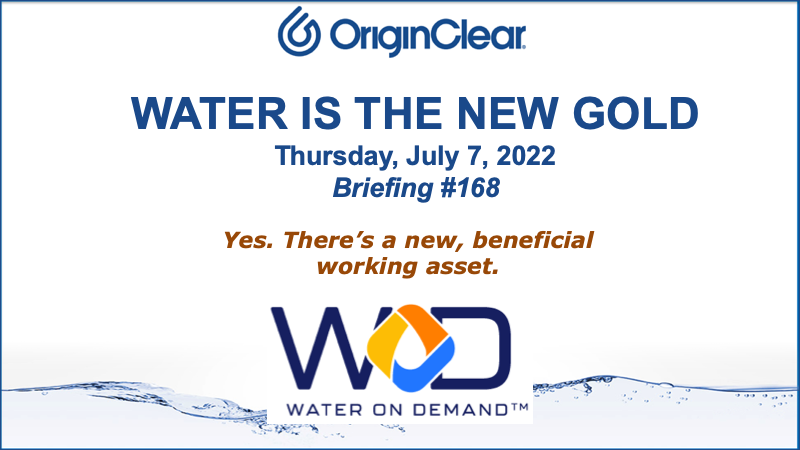
Riggs: And hello, everyone. I'm still jury-rigging my audio here. Some setting is forcing me to point the microphones at the speakers to make this thing work. And, Bob, you will hear about the hotel tonight. Yes, dear. So welcome, everyone. We're going to have a fascinating review of what's going on and let's have a party, OK? All right. I'm checking my phone because there's a pending announcement that I was hoping I was going to show you tonight. But it's not I don't have legal approval yet. It's freaking great news. Freaking great news. It's. All right. July 7th. And briefly, number 168, which is going on three years since we've been doing these multimedia things.
We were doing before that, I remember like back in 2012, 2014 and so forth. I was doing them with these broker calls on the telephone Thursday afternoon. That was kind of how I was going. But I think this is better. Yes, there's a new beneficial working asset. And James Wright says "Hi Riggs, holy cow, the link is working, hoorah! After two months." Well, Lord, have mercy. You know, I'm glad you debugged it. This is indicates that maybe we have a problem with some of our links. Glad you. Glad you got there.
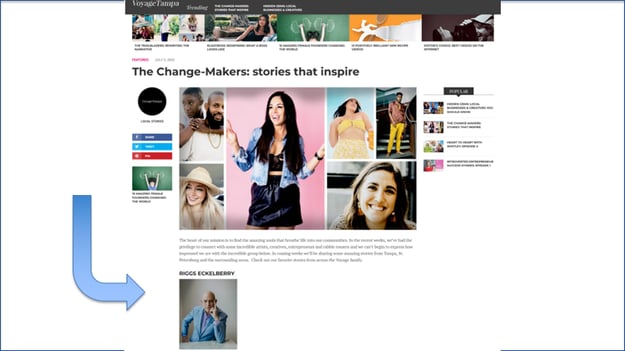
VoyageTampa Magazine
Okay. We're in the news. Voyage,Tampa magazine. Don't look at all the pretty girls. Look down there. Look at the picture of this guy. Yeah. So a little article here that was promoted by our agency. And basically it's my story, which is about how I had this weird, eclectic blend of nonprofit manning large ships, high tech and eventually, of course, in this fascinating water space.
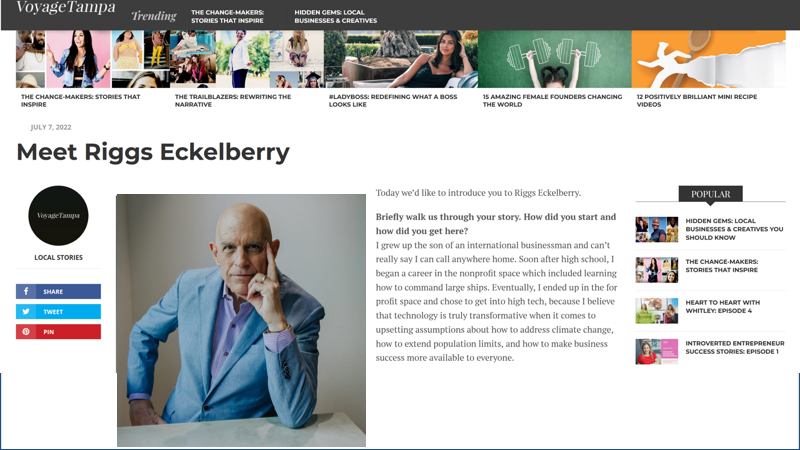
And then about some of my learnings that I basically learned about under capitalization, which I'm very fortunate that I have the investors we have today. And then, of course, I talk about Water on Demand and how people don't have to put the money up front. And that is going to be a big deal as I'm going to be talking more about.
Persistence, we're most proud of our persistence and we were not happy with the old school model. And so here we are in the new school model of doing things the modern way with water as a managed service. And that we are busy building this and planning to go to the Nasdaq.
How's it Going?
Now let's talk quickly about how things are going with the economy, with inflation and assets, etc.. And before we, I'm told that audio is soft. Let me just fix that right now. I know. I'll just come closer to the microphone. How's that, Bob? Are we happy? We happy in chat land? All right. I assume yes, because I don't see anything.
Premium Hotel
But just quickly, to cover the story about this premium hotel that we're providing incoming water for. There was this big puzzle as to what was going on and how come it wasn't live and not happening. And it turns out that the people who built the actual room in which the system is, built it with these teeny tiny drains. So they realized like, oops, we're going to have to fix the drains, otherwise there won't be any water getting into the hotel. That was not our job. That was a plain old plumbing job that was done by the contractor.
So that's being fixed. Meanwhile, we do anticipate launching this outstanding account because for a while there we're like, we couldn't understand what's going on. It's very typical problem where obviously we're not the developer of the real estate. And sometimes things go sideways. But that apparently Marc Stevens went there physically this week and debugged it.
About the Economy
Okay. So let's talk about economy, inflation, assets. How it going? Well, let's take a look. First of all, I'm going to go ahead and play a little clip here.
Start of presentation
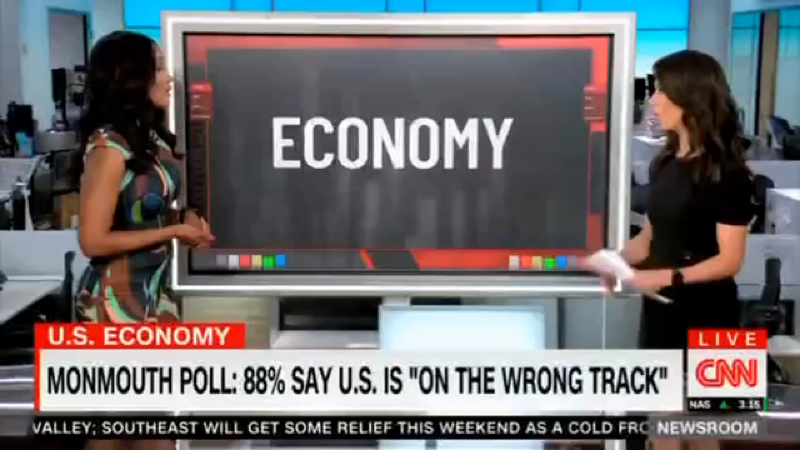
Commentator 1: Where do we stand right now with inflation?
Commentator 2: Well, I think for a lot of Americans, their reality is being shaped by the really high inflation. Let's take a look at CPI, consumer inflation. You'd have to go back to the early eighties to see the type of levels we're seeing in the last CPI report came in at about 8.6%. And of course, we know under the hood of that number it's really high energy prices, really high food prices.
The cost of new and used cars have gone up. Pretty much everything broad based has gone up, the cost of shelter has gone up, which has some economists really concerned. So I think if you are an American at home, it's really hard, perhaps understandably, to feel great about the economy right now, even though there are some silver linings when you're getting hit so hard with inflation, even personally on a you know, I talked to economists and traders and analysts every day about this, and sometimes I find myself shocked when I go to the grocery store and look at prices and think, wow, this costs this now. And so it's understandable.
End of presentation
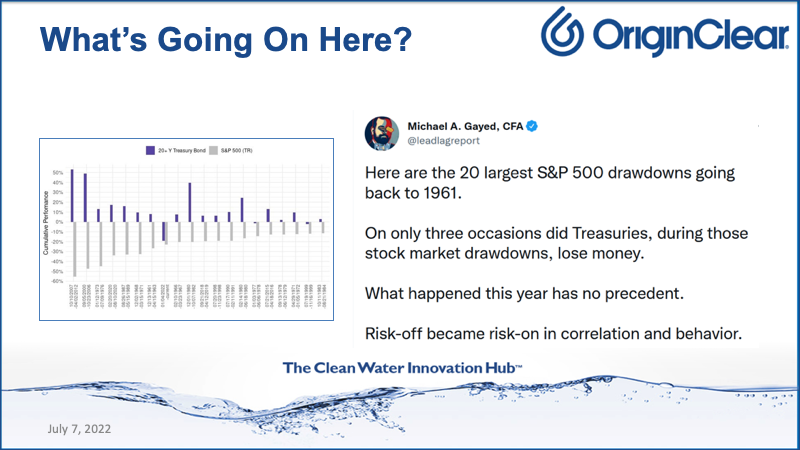
Market Drawdown
Riggs: Right! Silver lining! Sure. Yeah. I'm not sure what silver linings CNN is talking about because it's a pretty painful situation for, Americans are stuck with. Michael Gayed posted this. Here are the 20... Thank you. I got to go back to the microphone in front of me. Here are the 20 largest S&P 500 drawdowns going back to 61. All right. So normally stocks and bonds go opposite. Stocks crash. Bonds go the other way. It's called risk off. Risk off, meaning you de-risk yourself by holding treasuries.
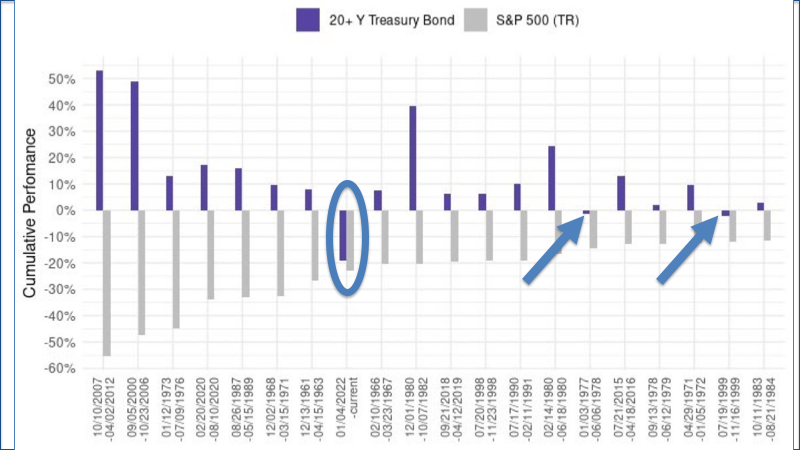
Bonds Going Lower
Here's what's crazy. Take a look at this. Only three times in history, I guess, since 1984 on this chart, do we have bonds going lower. Once was in 89, once was in 78. And here's the current one. Look at, stocks and bonds are almost completely in sync. This is weird. So what's up with that?
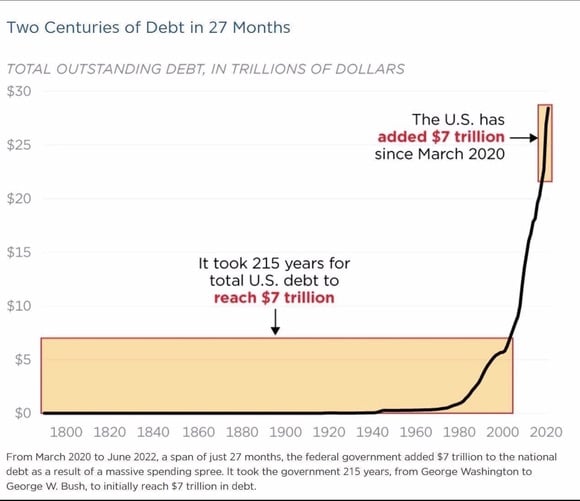
It's the Debt, Stupid!
Well, very simple. It's the debt, stupid! Right? So you add a lot of debt. You know, we thought we were doing a lot of debt in the mid 2000s. 2008. 2009. Ha ha. Well, you know, hold my beer, Lord. So obviously debt is being expanded at a ridiculous rate. We all know that.
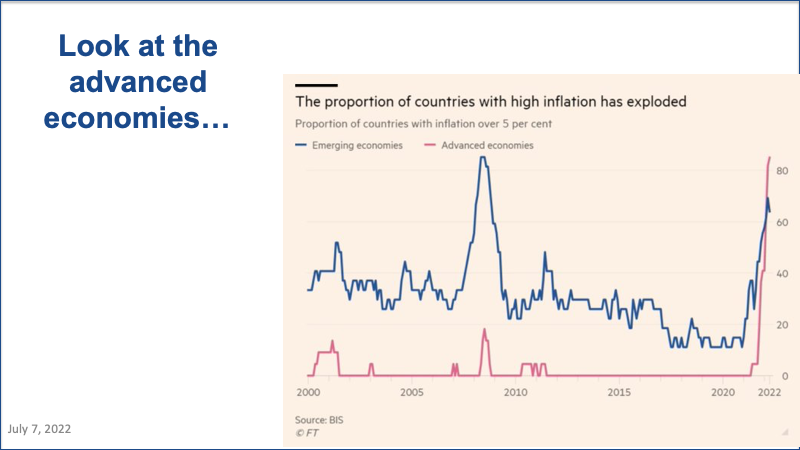
Countries with High Inflation
And in fact, look at what's happening. The proportion of countries with high inflation has exploded. So and it's the advanced economies. 85% of the advanced economies are in inflation, over 5%. The actual emerging economy is not as bad 67%, 63% of them are in high inflation. So advanced economies being in trouble.
I think it has a lot to do with the fact that well, we're the ones we issued all the debt, of course. And number two, we've had, we are highly dependent upon supply chain. And so when that falls apart, we're not quite as able to fall back on our own resources.
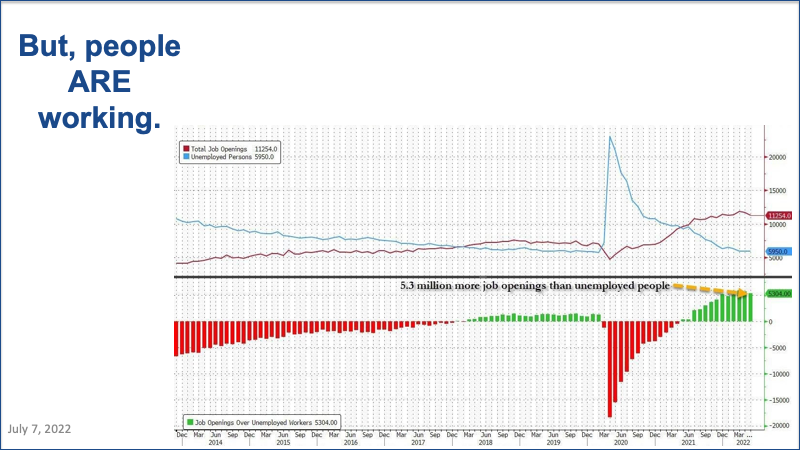
33% Loss in Purchasing Power
Now, here's what's interesting. People are working. There are 5.3 million more job openings than unemployed people. That's actually good news. There is work. People are working. Unfortunately, wages are not rising as fast as they should to compensate for the inflation. That's, so perhaps this is the silver lining, that people are working. But if they're frantically working and not taking the money home, that's a problem, too. For example, 33% loss in purchasing power for real estate through the rise in mortgage interest rates. So all of a sudden, that home that I wanted to buy is a third more expensive.
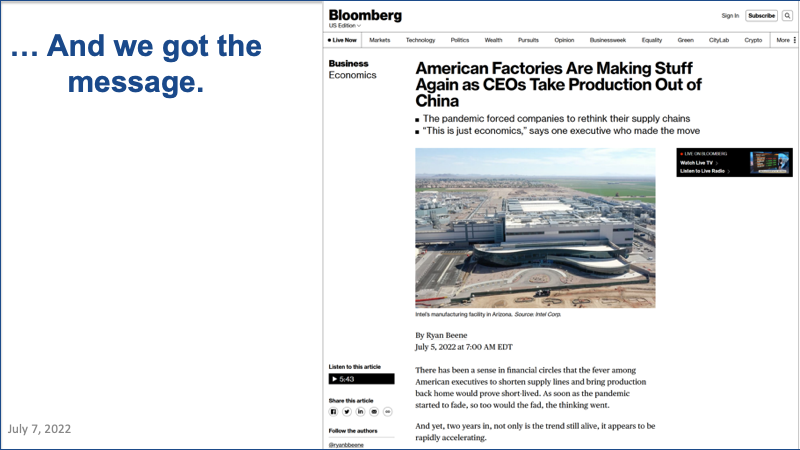
Bringing Things Back
But guess what? We did get the message about need to bring things back. Need to bring things back to America. And that, I think, is a lesson that's going to be tough, it's an accelerating trend. It is going to lead to a lot of construction, manufacturing and so forth here, which is really interesting. This picture of Intel's manufacturing facility in Arizona. And we we really did something foolish when we outsourced our critical chips to China. And then China went sideways and is continuing to, in fact. So. This is actually good news.
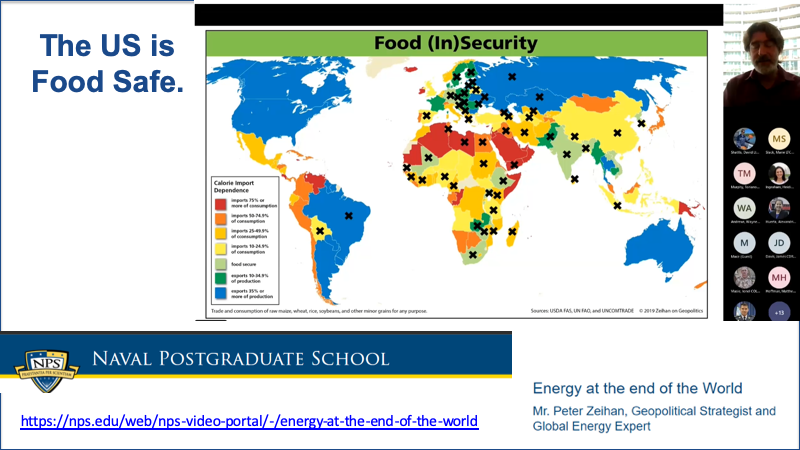
Food Safe
And I'm going to give you some more good news because I'm not about all bad news. Here we go. The US is actually food safe. This is a great, I recommend this very strongly. Peter Zeihan, amazing writer. He just issued a book called The Beginning of the End of the World, but he is basically an analyst about energy. But more specifically, he's really into understanding globalization.
And so things are broken in all these different areas. But interestingly enough, the North American landmass is in pretty good shape. So that's actually really good news. Some of the small areas that are not in bad shape, like Australia, in Argentina, Uruguay, Paraguay, places like that. But really the US is a net exporter and furthermore on energy we know that when things go crazy with future risk, take a look at this.
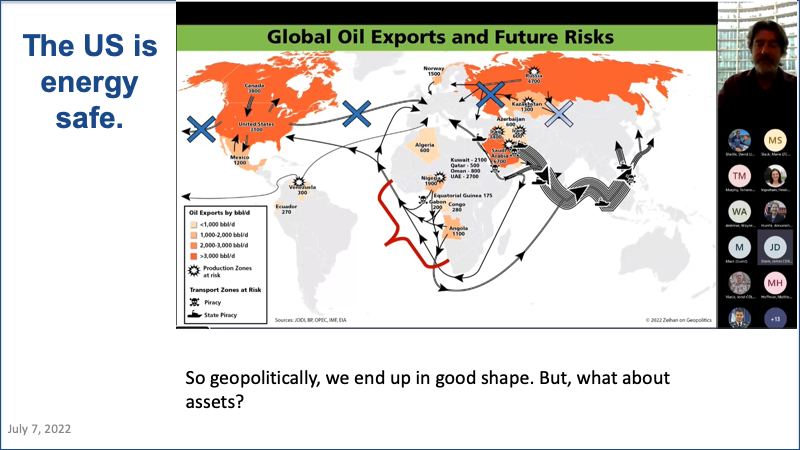
Petroleum Reserve & De-globalization
So you see risk areas here where the US is likely going to stop exporting once we get over this craziness of giving away our Strategic Petroleum Reserve to other countries. But you know, we will by necessity stop exporting. Of course, Russia is already, that's already not happening. And then you have the bottom left there, that bracket is all the production that the Europeans are going to grab.
And on the far right, they have this huge amount going to China, which is in trouble. And he gets into how it's in trouble. And furthermore, of course, they'll lose the Kazakhstan stuff. So if you take a look at what the US has going on here, 3100 barrels per day. Plus 3800 from Canada. But remember, that is, tarry sour crude, and we don't have the refineries for that. That was a piece of bad planning. Mexico contributes some, and so we have a chunk basically as much as Russia does, right? Not quite as much as Saudi Arabia does, but we're right in that league. So that's a really good sign.
So let's take a look, though, about how assets are doing in the middle of all this. So what I'm trying to say here is after all this noise, all this stuff that happens and de-globalization occurs and all this crazy inflation tapers off or whatever happens to it, the United States ends up pretty self-sufficient and it'll end up being, I think, an island of survival. So that's really good news for those of us who are here.
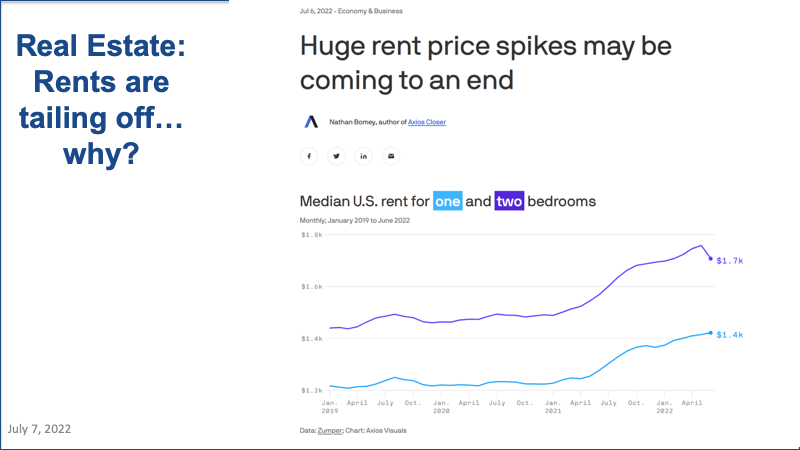
Now let's take a look at assets, real estate. Rent spikes are coming to an end. Why? Well, because, again, people's buying power is being sucked up by other things. So there's only so much money to go around. So the ability to get rents to go way high is falling off even while inflation is rising. So it's a perfect storm, a squeeze for landlords, for example, where costs are rising. At the same time, rents can only push so high. So that's a really tough situation.
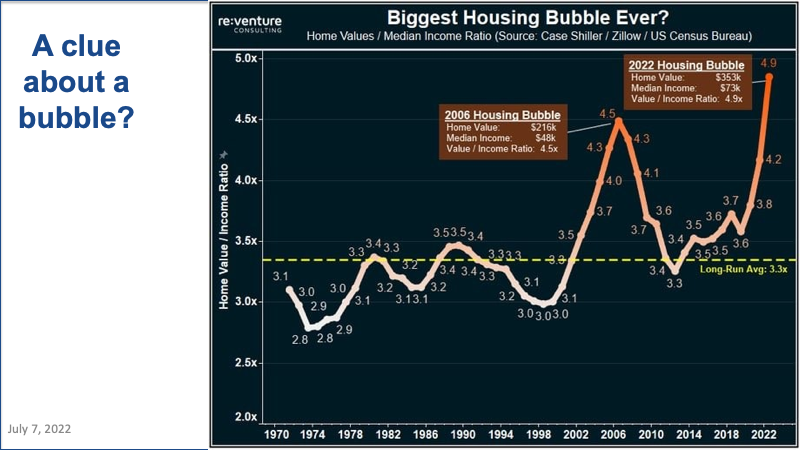
Bubbles Pop
And then we have this horrendous graph, the biggest housing bubble ever. So here we have the value to income ratio where the long term average is 3.3 times versus. So that's the value is 3.3 times the income. Right. Well, now it's five times your income. So that means they're starting to talk about generational mortgages, mortgages that people inherit. Literally, basically, your whole generations are just paying off the same darn mortgage. You know, it's pretty sad.
It makes you want to look back at 1974 there. Less than three on the value to income ratio. So what does that say? It says that things are inevitably going to pop, bubbles pop, and we're going to see home values in trouble.
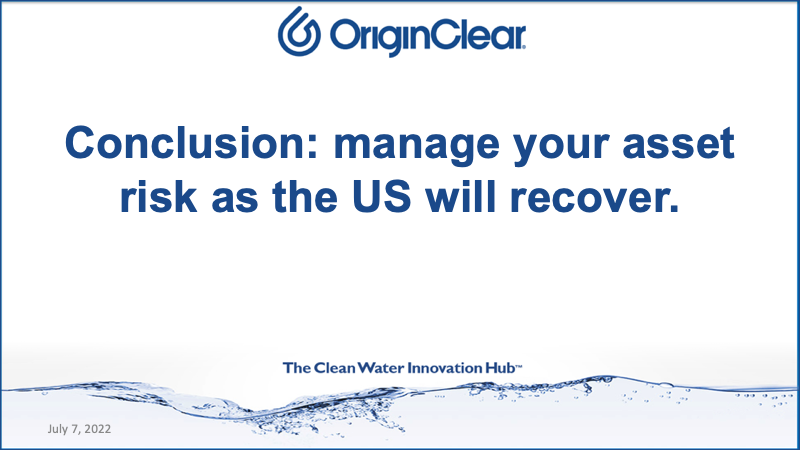
Beginning of an Asset
So basically. Manage your asset risk as the US will recover. So here's the thing, is that we have an opportunity and this is our mission, Ken and I have been discussing this, is to get people into this new asset class that is stable. Why? Because water just kind of serenely goes along. You need your water and there's no real ups and downs of water.
It's a recognized recession-proof industry. And furthermore, it has inflation. In other words, the water rates go up, so you have some inflation protection. So it's a very nice one. And furthermore, it's just coming out of governments. So it's been with the government and now it's more and more being privatized. So it's the beginning of an asset. It's kind of like the beginning of the cell tower boom. Right? It's the beginning of the water boom. Okay.
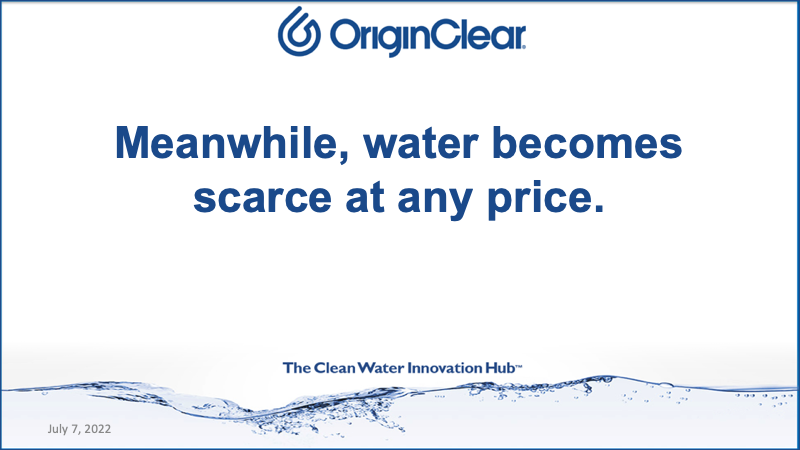
This is a scary situation.
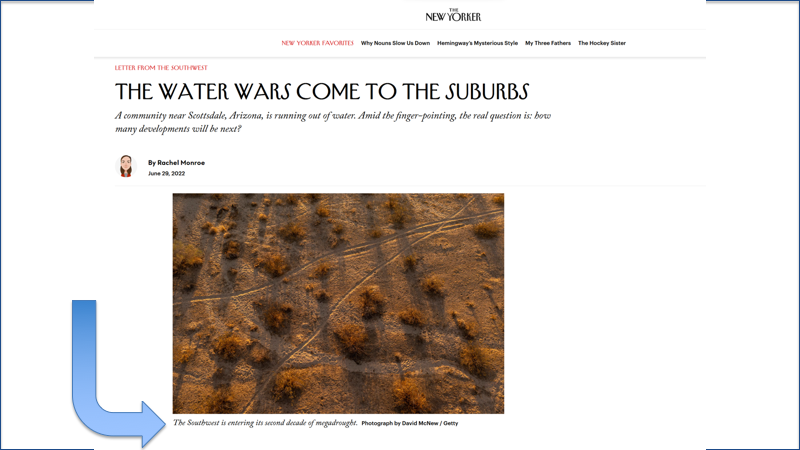
Water Wars
Water wars in Arizona, a second decade of mega-drought for the Southwest. Not a pretty picture. And it's going to turn into The Hunger Games, like scrambling for your toilet water every month kind of thing. Oh, Lord, they built in the desert, and of course, the places that were completely built out are now finding themselves short of water.
Opted for Hauling
The agreement that shared the Colorado's water was made at a time when flows were higher than they are now. And now it is not so pretty. So what do you do? Well, these properties were sold without a guarantee that their water would continue. And a lot of people opted to just go with hauled water and unfortunately hauled water got very political where Scottsdale last August entered, I guess late, late 2021, Scottsdale became entered stage one of its drought management plan. And it got worse and worse and no more water hauling. Not a good situation. So that's people are scrambling.
Turning to Private Utilities
And the neighbors are like, hey, you don't have water. Too bad for you, right? Not very. They believe it is what it is. So people are turning to private utility companies, right? So this company, Epcor, is providing water privately and people actually like working with private utilities. Interesting, isn't it?
And of course, we now know that more far more land was added than the ability to furnish water. And this is crazy what loopholes about a 1980 law requires developers to secure 100 years worth of water for their projects. But guess what? It got circumvented, it got hacked. And so they're not really constrained by that.
And finally, it's funny, but, you know, people are still able to sell their houses because the people buying still don't believe that there's going to be water trouble in the end. And I say, well. Not necessarily. Okay. So but if you're not, I'm going to end off with some good news which you'll enjoy.
Start of presentation
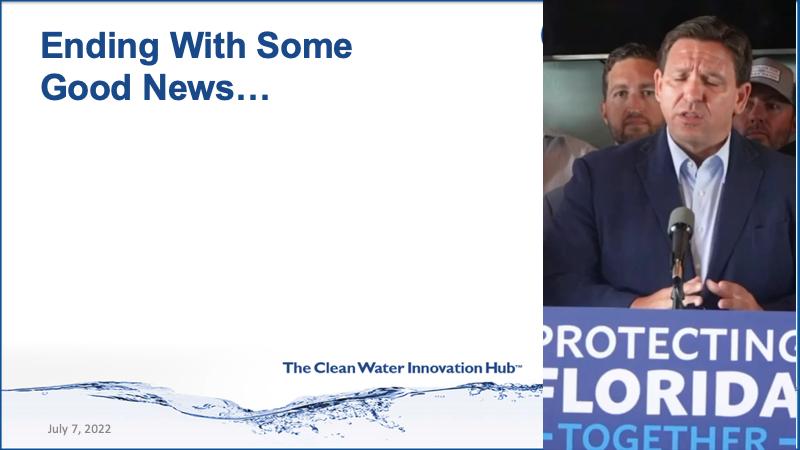
Gov. DeSantis: The overall commitment for water resources in Everglades for our four years was $2.5 billion, which represented a $1 billion increase over the previous four years. I'm happy in the budget I signed. We've actually done much more. It's going to be end up being about $3.3 billion over four years. That's more than double what had been done over the previous four years.
End of presentation
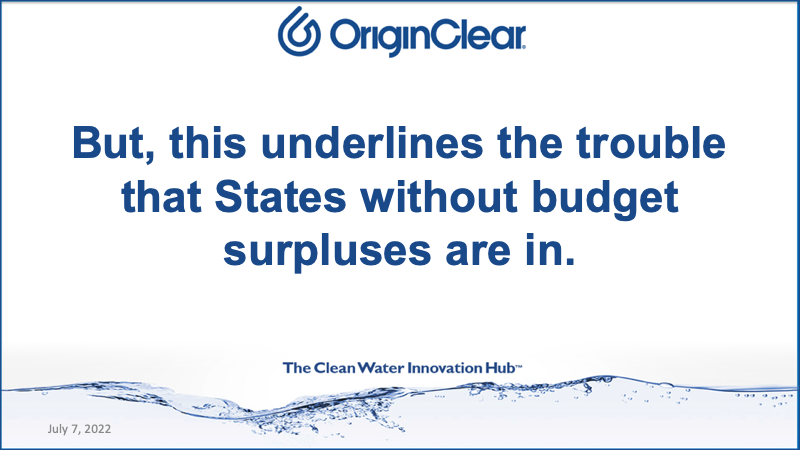
Riggs: That is some great news now. It's what they call a tale of Two Cities, right? What does this underline? This underlines a very simple situation. Florida is very lucky or just did it right that they have a huge budgetary surplus. This is not true of many, many other places that have giant populations, places like New York and Los Angeles. And so if you don't have the budget surpluses, you have a problem. So Florida is able to spend money, $3.3 billion on the Everglades, which is really needed because we can't have that become salty and messed up. So that is where we stand.
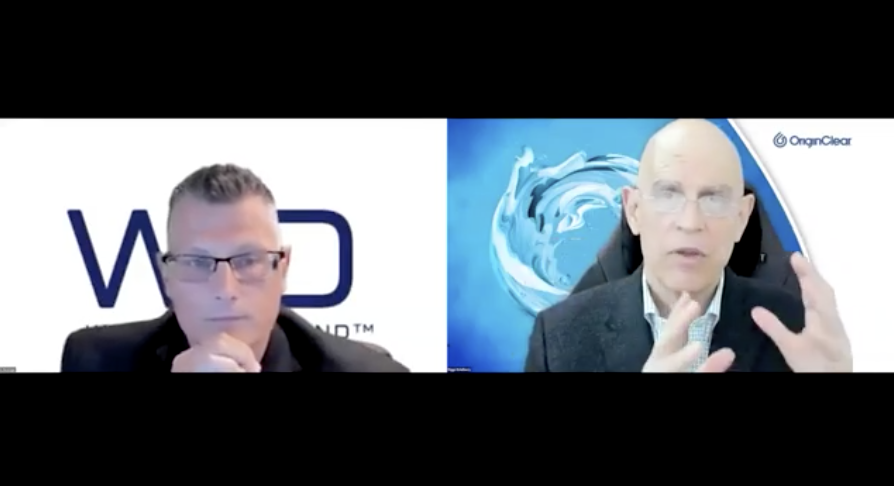
Freewheeling Discussion
And I'm going to ask Ken to come on and give us, let's discuss a little bit about this situation. I kind of threw around the various pieces of this. On the one hand, huge inflation. We know it's coming from the debt is a mess. That is a mess. And interest rates rising, hurting, purchasing power. At the same time, people are working.
A lot of on-shoring going on as globalization happens. It looks like there's going to be a period of two or three years of pain. What you don't want to have is your own portfolio gets nuked by those two or three years of pain. You got to survive it.
Generational Wealth and Earners
Ken: What I what I often say when I'm speaking to a lot of investors, there's two types of investors, those investors that are retired and or have generational wealth. Retired and generational wealth doesn't replace itself, so it has to live off what it's able to produce, right? And then you have earners, right? So like I always joke, I could put my money into dirt, bullets and crypto or gold, right? And I'll be okay because I'm earning money, right?
And I'll get through the next four years and I'll earn my living and I won't... So I could freeze dry my money in these portable assets, if you will. But generational wealth doesn't have the opportunity to do that. They're feeding, they're feeding families, the base of the family office money. And a retiree who might have accumulated a several million dollars in his life is now eating up principal because he's not. And that's not, and he's liquidating principle at a time when it's the least advantageous to do so. So very dear friend of mine. I just, I mean, an hour before this call, he's he works for a commercial real estate firm called Samson Morris.
Commercial Real Estate Reality
I won't I won't give his name because he says, you know, we don't want to get but there are major commercial regional commercial firm in the Pittsburgh region. These guys are, what he said to me is, "Kenny, I've been doing this for years and commercial real estate is constantly churning." In other words, it was a mad dash for everyone to refinance their commercial properties about six months ago, trying to get all, he goes, "Originations are gone. They're done. No one's doing them."
He goes, "Now they're sending me to sites and they want me to buy the, "I'm walking away from deals, because I can't, there's no way I can service the debt with your rent rolls." In other words, they're trying, I'm going there and I'm doing, They want to sell a property at an eight cap. I'm sorry. In other words, they want to they want to sell it for a six and a half cap when it's really an eight or nine cap property now. But the reality...
Riggs: Not everyone understands that. Go ahead. Tell me what that means.
Ken: So a nine cap or six cap, so a six cap property, it's basically a ratio on how you can monetize your rent rolls. So the higher the number, essentially what it is is the lower the price of the building. The end result is is that major, major, I'm talking $100 Million commercial projects, can't support the debt service with their rent rolls.
Here's the problem. Commercial real estate hasn't actually stopped, hasn't put down the pipe of whatever they're smoking and saying, okay, this property really is... No, no, no. We're going to get 20. We're going to get 10 million. No, you're not. No, we're going to get 10 million. We're going to get. So I think by the end of this year, he told me by the end of this year, the smoke will clear. Like, in other words, they'll put down the pipe, whatever the heck they are smoking, and reality will set in on these commercial properties.
Owner User vs Landlord
And the problem is, is that there are a lot of folks that just bought or just refinanced. Now, if you equity stripped, you're okay because you pulled out. You pulled out a bunch of equity. You've got some capital. But folks who just entered this market in the last six months to a year and some of these assets, they're going to have a really hard time supporting [it]. So my point is I'm looking to buy a commercial building, which I told you for reasons why, I explained. I'm an owner user, I'm Okay. But if you're a, if you're purely a landlord owner, right? Trying to derive income and service your debt, it's going to be very difficult for the next couple of years.
How We Can Help
Riggs: So what can they do? I mean, and how can we help?
Ken: Well, I'm glad you asked. So I've always been I've always been a hard assets guy. It's very hard to ask people to to devote capital to something that won't pay them while they hold it. So what you and I have, I think with a little bit of prescience, a little bit of good timing and a little bit of luck. Right? We've put together an asset class that will actually check the boxes.
Instead of putting your money into gold, which doesn't pay, you put your money into an asset that will inflate faster than core inflation. We can argue what the real inflation number is. You know, it's not, it's not 8.9. It's not, you know, but we don't have to argue about it. Water inflates at four and one half times, 4.25 times the speed over the last ten years of of core inflation.
So even if it's double that, by setting your utility rates at a discount of a 25% discount to what they would pay to either replace their water and or discharge toxic water, you're going to give the investors way the heck head start against inflation and that will happen. Now, look, no one's rooting for hyperinflation. We hope inflation collapses. But what would happen is so would water prices, but the profit would still be there for the end user and the profit would still be there for for the investor.
Brand New Asset Class
So what we've done about it is we've created a brand new asset class that I believe will start out fairly modest this year. But once we complete that fintech application, the ability to rapidly move money, to replicate money. You've shown that you've shown that graph where there's $43 Million of consolidated revenues with all these business units running full out. And then there's the banking thing. And the banking thing is like this. It's huge because bankers figured out a long time ago that all I have to do is take money from Riggs, lend it to Bob and I charge you both.
Riggs: No. 12 Bobs!
Right. Well, right, right. Exactly. You're exactly right. So I'm going to Bob. And Bob. And Bob and Bob. And Bob and Bob. But I'm taking your money. I'm lending it to Bob five times or ten times or 12 times. And every time there's a transaction that goes on, I'm making money. So by becoming see, look, our investors are always. That. Why? Why do investors watch the Fed? Because their investments are subject to the whims of global economies and global markets and if there's a war in Europe.
Demonopolizing and Democratizing Water
So the reason our our investors have always had the disadvantage of not being mega funds, they're wealthy individuals who want to get a little wealthier and try and stay ahead of the curve. Unfortunately, generally, institutions get in first, right? Governments get in first. We demonopolized water. So when, when the baby [boomer], anyone who is old enough, anyone who's got silver hair like me, remembers when Ma Bell got broken up. And the baby bells, they demonopolized the telecom industry.
People invested in those baby bells made an insane amount of money. When they created that that cell tower market, that was the same occurrence. When you demonopolize a market, when you take it out of government and you privatize it, there's always wealth. Now, generally, that wealth is concentrated with one or two folks that happen to be connected to government. You know what I mean? They had... But what we've done is we fully democratized this opportunity. And it was for it was for very practical reasons.
Right. You don't want to go to the big money because then they own you, right? Then you're back where you were. You're back to being a slave again. We opened it up to the private investor because, first of all, it's who we know. It's who we know how, it's who we communicate with. But secondly, it's an opportunity they never get. Number two. And number three, it's that you talk about the middle class being where it's the most heavily taxed.
The upper middle class and the middle class and I would say the affluent class, not the Jeff Bezos, but guys worth between one and $10 Million. We pay an enormous amount of taxes. Enormous amount of taxes. And the truth is, we're that cohort that desperately needs the wealth that we've accumulated over the last 30 years to be preserved, but we don't really have access. You know, you have to be part of government.
So what we've done is we've we've democratized it and we've monopolized water by privatizing it. We're not privatizing it by hoarding it. We're taking a resource that was controlled by government, we're opening it up to the private sector, and we're allowing a major discount to the guy who now can make it clean for cheaper. And instead of taking all of the wealth for ourself, we're spreading it out among those that invest alongside of us. I think that's the the most layman type of way of describing it.
Hedge Now – Don't Wait
Riggs: Well, I think that what we're trying to do here is get the word out as fast as possible so that people can take you know, can hedge. Now, they need to hedge now.
Ken: Right. So here's a fear. Here's a fear. The reason I'm doing this now, right, is because I'm afraid that my stock positions, I'm using down payments that I have in stock. I don't think it's going to be there. And I don't want to go to cash, because if you go to cash, you're giving away 20% a year. Right? So you're stuck. You know what I mean? You go into a cave and you wait out the nuclear winner? No, that's not really a good option. There'll be tremendous opportunities out there.
The reason I really stress now is because the leverage that exists in the pilot stage of an opportunity is unprecedented. Now, normally that comes with mind boggling risk, right? The early stages of Airbnb, Amazon, Uber, Stripe, there was 100% risk. Matter of fact, Airbnb, the year before they went public, almost didn't because of COVID, right? You know, so that was an emergency billion dollar fund funding event.
The difference, what we're doing is, that although the pilot is early, there's the security of the asset and then while this first 20 million is still happening, we're giving away one and a half, well, right now, it's one and one half times their investment in a stock that already trades. And by being this incubator. And I don't think I don't know if the news you wanted to talk about that you're waiting on legal is about that incubation stuff. Are we talking about that yet? No.
Incredible Sales Growth
Riggs: No, no, no. It's it's about a sales growth.
Ken: Okay.
Riggs: Pretty astonishing. Okay.
Ken: Got it. All right. So I won't. Never mind.
Riggs: In fact, you know what I can... I can show. I'll be happy to show our forecast page. And so we plan to make an announcement of this at some point. If you take a look here, first half of 2022 closed out at 206% of first half, 2021, which is, now, these are orders, right? These are orders. They're not revenue. They are simply purchase orders that we received. They're closed. It's closed. They're in. But so that is pretty amazing news. So the good news about what's going on here is that the company operating units are booming.
Now, is it because people have a use it or lose it mentality about their budgets? I don't know, but I'll take it, right? Meanwhile, you're right that there's another piece of news that's developing. I don't think I'll be able to talk about it seriously until next week, where our own ability to launch companies,
Ken: Business units, yeah?
Riggs: Business units is itself becoming monetized.
Ken: Right.
Riggs: And beyond that, I'm not going to discuss, but this is very, very good.
Ken: So, that'll be a lot of fun to talk about that next week because I think that the implications or the potential for that, once...So, it's like what happens after these five business units launch? Well, we're a much, much, much, much, much bigger company. But the story is not over. The story is actually just begun, which is, which is super exciting. So we'll leave it at that.
Time to Rethink
The fear I have right now is that folks that wanted to, folks that wanted, that actually committed to invest in Water on Demand got some of their investment done and the other resources they were going to be pulling it out of because they were worried about them collapsed. Right. I think there's more of that between now and the end of the year.
So I really think it's time to rethink. I went to cash on a lot of stuff that I knew I was going to be taking a hit on simply because I'd rather have them, I wouldn't, I don't want the money in a spider web. You know, I'm just kind of waiting for it to come along and just get blasted. I believe that when this kind of destructive cycle concludes, there will be widespread opportunity across all sectors.
However. None of them. Not one of them are centered around the rapid global globalization, rapid scalability of what's necessary for all life on Earth. Right? So, I think we have a couple of advantages, you know. And I really think that while just so few people know about what we're doing, I do think that now that we've we've launched on the, we can talk about MSC, right?
Riggs: We, the public announcement has gone out.
Ken: Okay, we're up on it. So now that we're now that we have a national or international audience, as we begin to really start to magnify that message, I think that the average sophisticated investor understands intuitively that here's what here's what my friend said to me in commercial real estate. "Everything we've done for the last ten years does not apply here. Nothing works. Like all the tricks that we know to monetize commercial real estate, None of them work right now."
Riggs: Ouch.
Ken: Right. He goes, "So, we're freaked out. We're freaked out." So we're going to be stuck in a owner user commercial real estate market. No more, there's going to be for a period of time no buying commercial real estate to monetize as a landlord because the debt service is too expensive. We don't even know what kind of effect that has on the market. That comes on the heels of stuff being empty for two years because of COVID.
Riggs: And also the changes in work habits, for example. Right.
Ken: People working from home. Well, some major companies are insisting people come back to work. But that's not happening everywhere. Right. The stay at home thing is still being enforced by some of these suicidal cities. So the idea that we can provide something that is wildly beneficial to the planet. Right. But that doesn't have to be your motivation. The guy who invests in Water on Demand may be doing it because he just wants a safe place, he wants to grow and preserve his wealth like the big guys, right? He doesn't have to necessarily want to make the world better, but he's doing it even if he doesn't want to. Right. And that's, and that's really the kind of a cool aspect of what we're doing.
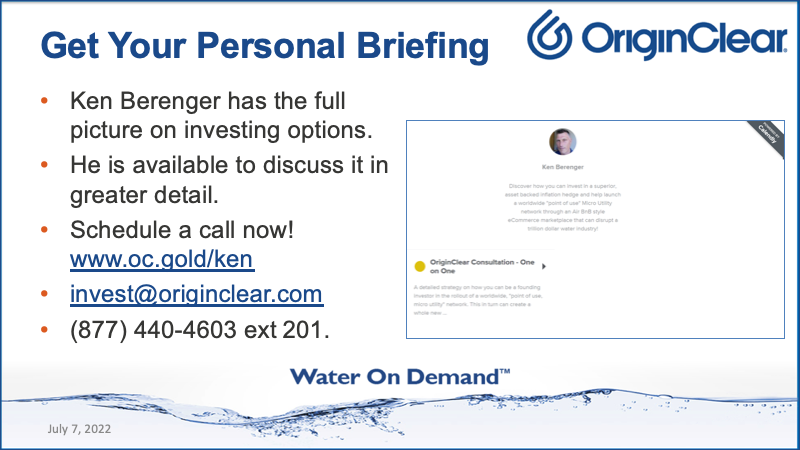
Call Ken
Riggs: Well, with that, I'm very excited and I think this is a very good time to let everyone know that if you want to talk to Ken further, here is his data. oc.gold/ken is best way to schedule him and that's at OriginClear.com and he'll be happy to discuss it. I think that a lot of people are looking at the cash they have because we all keep some cash and like what I do with this.
Ken: I know, I know. And you don't want to just sit it there because you know you're losing buying power, right? You have to have a certain amount, but you don't have to have as much as you have. But you don't want to deploy it anything because everything you've done in the last six years, less six months, rather as well. I'm speaking of me, of course, has not been good.
Riggs: The good news is, what I got from these various slides I showed today was, it will become better. There will be recovery.
Ken: Absolutely.
Riggs: Especially for the United States because of our wealth of resources. We have a very strong consumer base, food, energy, all those things. So it will work its way out, but it'll be very, very freaky.
Ken: The fact that there are millions more jobs available than people working is a testimony to our strength. So I think once this demand destruction cycle is complete, there'll be green shoots. In the meantime, find an asset that has safe haven potential during inflation.
Riggs: And makes money.
Ken: That has these very cool kind of cap appreciation points. Right, which is what we put together.
Riggs: Ken, it's been fascinating tonight. Thank you very much. It's really interesting times. Thank you, everyone, for joining us. And be in touch with Ken. Enjoy the weekend and remember it all will come out okay.
Ken: Sure. Good night.
Riggs: Peace out.
Register for the next Insider Briefing: HERE
%20250px.png?width=250&height=53&name=OriginClear%20Logo%202019%20(RGB)%20250px.png)




